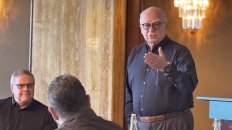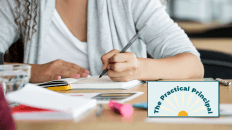In August, the 2020 Teachers of the Year for Region 13 were announced, and we couldn’t be more thrilled with the results. Dozens of talented and inspiring teachers from across our region were nominated, and two were ultimately chosen: Deirdre Doughty and Kari Swanson.
We interviewed Deirdre Doughty, a secondary Social Studies Research Methods and US History teacher to see how she got her start and how she thinks about teaching.
How did you get your start in education? What lead you to a career in education?
I wanted to be a teacher ever since I was a little girl–I just wasn’t sure what and where I wanted to teach. I come from a family of educators–both of my parents were public school teachers and I have several aunts and great-aunts who were teachers, also. And my grandfather was a geography professor. So they all inspired in me a deep respect for the profession. Plus I love to learn and I love to interact with and help people–and teaching is the perfect job to do both.
What areas or subjects do you currently teach? What do you like about them?
I’m a social studies teacher. I teach Social Studies Research Methods (SSRM) to 9th graders and US History to 11th graders. I love that social studies courses–when we focus on civics and on the history of all groups of people–help students to understand themselves and their families as historical actors; they help students to learn empathy and tolerance, and they allow me to help students find and use their voices to become civically engaged (and this is especially important for the students I typically teach, students that come from traditionally underserved and under-represented populations).
What do you think the hardest part of teaching is / being a teacher? What would you suggest to a teacher currently struggling with that problem?
We teachers face long hours and are underpaid for our hard work– and we are frequently met with student behavior that can be frustrating and, at times, even hurtful. That coupled with the general societal lack of respect for the teaching profession can easily lead to burn-out. When I start feeling this way I remind myself of the good that we educators do. We have, arguably, the most important job in America. Our job is to empower young people—by educating them and also by helping them find their own self-worth and to find—and use–their voices. That is so awesome and we should all feel very proud of what we do. Also, at the end of an especially hard day, I remind myself to think back and find at least one positive moment and then focus on that instead of the negatives.
What’s the best part about teaching?
The students! Seeing them realize that they have strengths and capabilities that they didn’t know they had is the best feeling in the world.
What advice would you give to new teachers?
To be an effective teacher, you need to first gain the trust of your students. Building relationships with students is key. This happens when you treat them as fellow human beings, rather than just students. In my classroom we, myself included, begin every day by voluntarily sharing a positive thing (big or small) in our lives. This creates a climate of shared community and really helps to set a positive tone (plus we get to know each other better!). Also, don’t take the negative behavior or comments personally (harder to do than say, I know!). And stay positive no matter how frustrated, cranky or tired you may feel. Redirection with a smile is so much more effective.
How do you maintain a positive work-life balance?
Not sure that I do! Like most of us, I spend long days at my school and work at home in the evenings and on weekends. This is an area I need to improve in. My husband and I have 3 kids (all teens now) and one thing that has helped me recharge and to stay connected to my family is to make sure that we eat dinner together every night and that I reserve some time on the weekends to go out with my husband and/or to play table-top games or watch a movie together as a family.
What are some new educational tools that have benefited your classroom?
Our district uses G Suite and I love the fact that Google Classroom (along with Google Docs and Google Slides) has allowed me to go virtually paperless. These resources also really facilitate collaboration between the students. And I love using Google Forms for informal assessments-it give students the opportunity for immediate feedback. We also use Google Forms in class for student-created research surveys.
Cole Bubenik is a Content Marketing Specialist here at Region 13.





Add comment